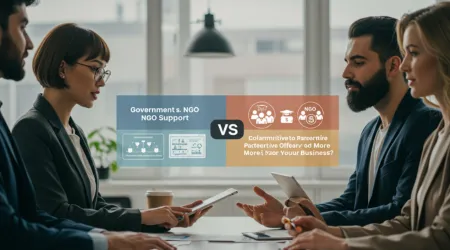Government vs. NGO Support: Which One Offers More for Your Business?

Anúncios
In the dynamic landscape of 2025, Government vs. NGO Support shapes how businesses access resources, funding, and growth opportunities.
Entrepreneurs and small business owners face a critical choice: rely on structured, often bureaucratic government programs or tap into the agile, mission-driven assistance of non-governmental organizations (NGOs)?
Both avenues offer distinct advantages, but their approaches, priorities, and impact on your business vary significantly. Understanding these differences can unlock strategic opportunities, ensuring your business thrives in a competitive market.
This article dives deep into the nuances of Government vs. NGO Support, offering insights, real-world examples, and practical guidance to help you make an informed decision.
The choice between government and NGO support isn’t just about funding it’s about aligning with the right partner for your business’s vision.
Anúncios
Government programs often provide stability and scale, while NGOs bring flexibility and community focus. To illustrate, consider a small organic farm in California seeking expansion funds.
A government grant might offer substantial capital but require extensive compliance, whereas an NGO could provide tailored mentorship and smaller, faster grants.
Which path fuels your growth best? Let’s explore the strengths, limitations, and strategic fit of Government vs. NGO Support to guide your decision.
Understanding Government Support for Businesses
Government support for businesses typically involves financial grants, tax incentives, and regulatory assistance designed to stimulate economic growth.
In 2025, governments worldwide continue to prioritize small and medium enterprises (SMEs) as engines of innovation.
For instance, the U.S. Small Business Administration (SBA) offers loans like the 7(a) program, providing up to $5 million for eligible businesses. These programs ensure access to capital but often come with stringent eligibility criteria.
++ The Freelancer’s Survival Guide to Navigating Public Assistance
Beyond funding, government support includes infrastructure benefits. Think of subsidized utilities or access to public procurement contracts, like the UK’s 2025 initiative to boost SME contracts, which opened £50 billion in opportunities.
Such programs create predictable revenue streams for businesses. However, navigating bureaucratic processes can be daunting, often requiring legal or financial expertise to secure benefits.
Time is another factor. Government applications can take months, delaying critical growth plans. A 2024 study by the OECD found that 60% of SMEs cited bureaucratic delays as a barrier to accessing government funds.
Businesses must weigh this against the stability and scale of government-backed resources, which often outmatch NGO offerings in sheer volume.

The Power of NGO Support for Businesses
NGOs, by contrast, excel in agility and mission-driven support. Organizations like TechnoServe or Root Capital focus on empowering businesses in specific sectors, such as agriculture or sustainability.
In 2025, NGOs are pivotal in addressing gaps left by government programs, particularly for underserved communities. They offer grants, training, and networking, often with fewer bureaucratic hurdles.
Take the example of Maya’s Coffee Co., a Guatemalan startup that partnered with an NGO to access microgrants and training in sustainable farming.
This support helped Maya’s scale production by 30% in one year, without the red tape of government programs. NGOs prioritize impact over profit, making them ideal for businesses aligned with social or environmental goals.
Also read: Using COVID-Era Benefits to Build Something New in 2025
However, NGO funding is often smaller and less predictable. Many rely on private donations or corporate partnerships, which can fluctuate.
For instance, post-COVID funding challenges reduced NGO budgets by 20% in 2024, per a Bond report. Businesses must plan for this variability when choosing Government vs. NGO Support.
NGOs also foster community engagement. They connect businesses to local networks, enhancing brand loyalty.
A small bakery in Nairobi, supported by an NGO like Heifer International, gained access to local markets and training, boosting sales by 25%. This grassroots approach contrasts with the top-down structure of government programs, offering a more human touch.
Comparing Scale and Accessibility
Scale is a key differentiator in Government vs. NGO Support. Government programs, backed by taxpayer funds, offer larger budgets.
The U.S. government allocated $1.2 trillion to economic development in 2025, dwarfing the $8 billion managed by U.S. NGOs. For businesses needing significant capital, government support is often unmatched.
Accessibility, however, tilts toward NGOs. Government programs require detailed applications, credit checks, and compliance with regulations.
NGOs, with their community focus, often have simpler processes. A tech startup in India, for example, secured a $10,000 NGO grant in weeks, compared to months for a government loan. Speed can be critical for businesses in fast-moving markets.
Read more: Emergency Business Relief: What Qualifies as a “Disaster”?
Yet, NGOs may prioritize specific causes, limiting their scope. An environmental NGO might only fund green businesses, while government programs cast a wider net.
Businesses must align their goals with NGO missions to maximize benefits, a step not always required with government support.
The table below summarizes key differences:
| Aspect | Government Support | NGO Support |
|---|---|---|
| Funding Scale | High ($ millions) | Lower ($ thousands to millions) |
| Accessibility | Complex, bureaucratic | Simplified, flexible |
| Speed | Slow (months) | Fast (weeks) |
| Focus | Broad economic growth | Social, environmental, or community goals |
| Stability | High, taxpayer-backed | Variable, donor-dependent |
Strategic Fit for Your Business
Choosing between Government vs. NGO Support hinges on your business’s goals and capacity. Large enterprises with resources to navigate bureaucracy benefit from government programs.
A construction firm securing a government contract for infrastructure projects can leverage stable funding and long-term contracts, ensuring steady growth.
Smaller businesses, particularly in niche sectors, may find NGOs more suitable. A women-led startup in rural Kenya, for instance, might benefit from an NGO’s mentorship and microgrants tailored to gender equity.
NGOs often provide hands-on support, helping businesses build capacity without overwhelming administrative demands.
Consider your timeline and mission alignment. If your business needs quick funding for a community-focused project, NGOs are ideal.
For long-term investments, like expanding manufacturing facilities, government support offers unmatched scale. Evaluate your resources and strategic priorities to decide.
Another angle is risk tolerance. Government programs, while stable, may impose strict compliance, risking penalties for non-compliance. NGOs, with fewer regulations, offer flexibility but less certainty.
A craft brewery in Oregon, for example, used an NGO’s marketing support to reach eco-conscious consumers, avoiding government red tape while building brand loyalty.
The Role of Collaboration in 2025

In 2025, the lines between Government vs. NGO Support are blurring as collaborations grow. Programs like the Bill & Melinda Gates Foundation’s partnerships with governments and corporations show how hybrid models can amplify impact.
These collaborations combine government scale with NGO agility, benefiting businesses in innovative ways.
For example, in Togo, the Integrated Primary Care Program, a partnership between Integrate Health and the Ministry of Health, scaled healthcare access for SMEs by training community health workers.
Businesses gained healthier workforces, boosting productivity. Such models show how businesses can tap into both systems for maximum benefit.
These partnerships also address funding gaps. NGOs often secure government grants to fund programs, blending public resources with private-sector efficiency.
A 2025 UK-India trade agreement, for instance, funneled £50 million into NGO-led SME support, creating 2,200 jobs. Businesses should explore these hybrid opportunities to diversify support.
Collaboration also mitigates risks. Government-NGO partnerships can streamline compliance, reducing bureaucratic delays.
A tech firm in Manitoba benefited from a joint Canada-Manitoba program, receiving $6 million in funding through an NGO intermediary, cutting application time by 40%. This model offers a balanced approach for businesses seeking efficiency.
Making the Right Choice for Your Business
Imagine your business as a ship navigating turbulent waters. Government support is a sturdy, slow-moving freighter, offering stability but requiring a skilled crew to maneuver.
NGOs are nimble sailboats, quick to adapt but vulnerable to funding storms. Which vessel suits your journey? Aligning Government vs. NGO Support with your business’s needs ensures smooth sailing.
Assess your priorities: scale, speed, or mission alignment. A government loan might fund a factory expansion, while an NGO’s mentorship could refine your sustainability practices.
Research local options check SBA programs or NGOs like Bal Raksha Bharat for tailored support. Hybrid models, combining both, may offer the best of both worlds in 2025.
Ultimately, the choice depends on your vision. A 2024 World Bank report noted that 70% of SMEs using hybrid support models reported higher growth than those relying solely on one source.
Explore both avenues, weigh their strengths, and choose strategically to propel your business forward.
Frequently Asked Questions
Q: How do I know if my business qualifies for government support?
A: Check eligibility on government websites like SBA.gov or local economic development portals. Requirements vary by program, often needing financial records and business plans.
Q: Can NGOs provide long-term funding like governments?
A: NGOs typically offer shorter-term grants, but some, like Root Capital, provide multi-year support. Confirm funding stability with the NGO before committing.
Q: Are there risks in partnering with NGOs?
A: Yes, funding variability and mission-specific focus can limit flexibility. Research the NGO’s track record and donor base to ensure reliability.
Q: How can I access hybrid government-NGO programs?
A: Look for initiatives like the UK-India trade agreement or local partnerships through economic development agencies. NGOs often advertise these opportunities on their platforms.
This detailed exploration of Government vs. NGO Support equips you with the knowledge to make informed decisions, leveraging real-world examples and current trends to guide your business’s growth in 2025.
